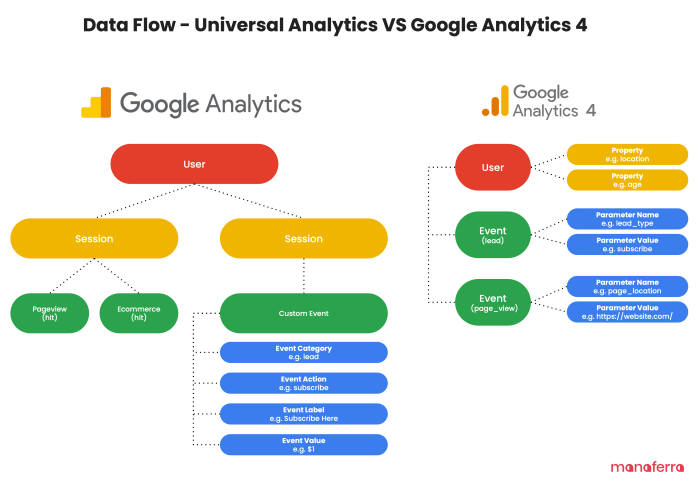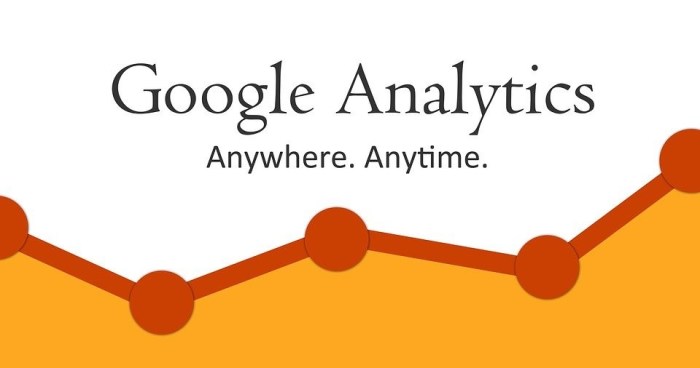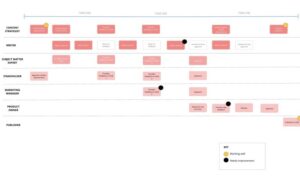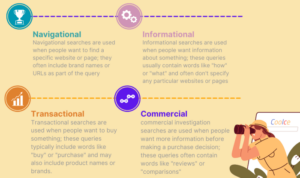Using Google Analytics to Track Conversions kicks off a journey into the world of digital marketing analytics, where every click and conversion counts towards success. Dive in to discover how you can level up your marketing strategies with data-driven insights.
Overview of Google Analytics
Google Analytics is a powerful tool used by businesses to track and analyze website traffic and user behavior. It provides valuable insights into how users interact with a website, what pages they visit, how long they stay, and much more. This data helps businesses make informed decisions to improve their online presence and user experience.
Importance of Google Analytics in Digital Marketing
- Google Analytics allows businesses to track the effectiveness of their digital marketing campaigns by providing data on conversion rates, bounce rates, and other key metrics.
- By understanding user behavior and preferences, businesses can optimize their website content and design to better meet the needs of their target audience.
- With Google Analytics, businesses can identify trends, patterns, and opportunities for growth, helping them make data-driven decisions to improve their online performance.
- Tracking conversions through Google Analytics helps businesses measure the success of their marketing efforts and allocate resources effectively to achieve their goals.
Setting Up Conversion Tracking

To set up conversion tracking in Google Analytics, follow these steps:
1. Log in to your Google Analytics account and navigate to the Admin section.
2. In the View column, click on Goals and then click on the New Goal button.
3. Choose a goal template or select Custom to create a specific goal.
4. Enter a name for your goal and select the type of goal you want to track (e.g., destination, duration, pages/screens per session, event).
5. Configure the goal details based on your chosen type (e.g., specify a destination URL, duration, event category).
6. Save your goal, and Google Analytics will start tracking conversions based on your settings.
Types of Conversions
There are different types of conversions that can be tracked using Google Analytics, including:
– Purchases: Tracking completed transactions on an e-commerce website.
– Form Submissions: Monitoring when users fill out and submit a form on your website.
– Sign-ups: Keeping track of new user registrations or subscriptions.
– Downloads: Recording instances where users download a file or resource.
– Clicks: Tracking specific button clicks or interactions on your site.
Benefits of Tracking Conversions for Businesses
Tracking conversions in Google Analytics offers several benefits for businesses, such as:
– Understanding User Behavior: Gain insights into how users interact with your website and what actions lead to conversions.
– ROI Measurement: Determine the effectiveness of your marketing campaigns and investments by tracking conversion rates.
– Optimization Opportunities: Identify areas for improvement on your website to increase conversion rates and overall performance.
– Targeted Marketing: Use conversion data to create targeted campaigns that resonate with your audience and drive more conversions.
– Performance Analysis: Evaluate the success of different channels, campaigns, or strategies based on conversion data to make informed decisions for future initiatives.
Interpreting Conversion Data

When it comes to interpreting conversion data from Google Analytics, businesses can gain valuable insights into the effectiveness of their marketing strategies and the behavior of their website visitors. By analyzing this data, companies can make informed decisions to optimize their campaigns and drive more conversions.
Key Metrics to Look Out For
When analyzing conversion data, businesses should pay close attention to key metrics that can provide meaningful insights into the performance of their campaigns. Some important metrics to look out for include:
- Conversion Rate: The percentage of website visitors who complete a desired action, such as making a purchase or filling out a form.
- Goal Completions: The number of times a specific goal, such as signing up for a newsletter, is achieved.
- Conversion Funnel: The steps that users take before completing a conversion, helping identify potential areas for improvement.
- Revenue: The total amount of revenue generated from conversions, providing insights into the ROI of marketing efforts.
Using Conversion Data to Optimize Marketing Strategies
Businesses can leverage conversion data from Google Analytics to optimize their marketing strategies in several ways:
- Identifying Top Performing Channels: Analyzing conversion data can help businesses identify which marketing channels are driving the most conversions, allowing them to allocate resources effectively.
- Optimizing Landing Pages: By tracking conversion data, businesses can identify underperforming landing pages and make necessary changes to improve conversion rates.
- Testing and Iterating: A/B testing different elements of campaigns based on conversion data can help businesses refine their strategies for better results.
Conversion Attribution Models: Using Google Analytics To Track Conversions
In Google Analytics, attribution models are used to determine how credit for conversions is assigned to different channels or touchpoints that a user interacts with before completing a desired action on a website.
Types of Attribution Models
- First-Click Attribution: This model gives all the credit for a conversion to the first touchpoint that a user interacted with.
- Last-Click Attribution: In contrast, last-click attribution assigns all the credit for a conversion to the final touchpoint before the conversion.
- Linear Attribution: This model evenly distributes credit for the conversion across all touchpoints in the user journey.
Choosing the Right Attribution Model, Using Google Analytics to Track Conversions
It is crucial to select the appropriate attribution model based on the specific goals and user behavior of a website. Each model has its strengths and limitations, impacting how conversions are tracked and analyzed.





